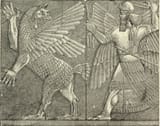Search Results
6/24/2025, 3:28:12 PM
>>40593783
>>40593797
Sitchin just made stuff up, academics hate him. From "The Myth of a Sumerian 12th Planet" by the biblical scholar Michael Heisser:
>What do the cuneiform texts tell us about Nibiru – particularly in contradiction to Zecharia Sitchin? Here’s the list:
>Nibiru is called a star.
>Nibiru is called a planet – nearly always Jupiter-Marduk, but once Mercury, and never anything beyond Pluto or the known planets.
>The Sumerians, by their own records, knew of only five planets (and accepted the sun and moon as planets.)
>Nibiru is never mentioned in any respect with the Anunnaki; it is never said to have been or be inhabited.
>Nibiru is both a “fixed star” in some relationship to constellations (whether a member or just in proximity is unknown) that “holds” them in their courses, but is also described as “changing position” and “crossing” the sky at times.
>Nibiru was seen every year, which demolishes Sitchin’s view of a 3600 year cycle for it.
>>40593797
Sitchin just made stuff up, academics hate him. From "The Myth of a Sumerian 12th Planet" by the biblical scholar Michael Heisser:
>What do the cuneiform texts tell us about Nibiru – particularly in contradiction to Zecharia Sitchin? Here’s the list:
>Nibiru is called a star.
>Nibiru is called a planet – nearly always Jupiter-Marduk, but once Mercury, and never anything beyond Pluto or the known planets.
>The Sumerians, by their own records, knew of only five planets (and accepted the sun and moon as planets.)
>Nibiru is never mentioned in any respect with the Anunnaki; it is never said to have been or be inhabited.
>Nibiru is both a “fixed star” in some relationship to constellations (whether a member or just in proximity is unknown) that “holds” them in their courses, but is also described as “changing position” and “crossing” the sky at times.
>Nibiru was seen every year, which demolishes Sitchin’s view of a 3600 year cycle for it.
Page 1
